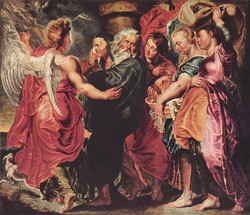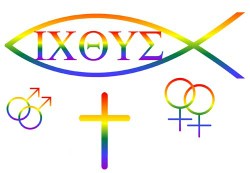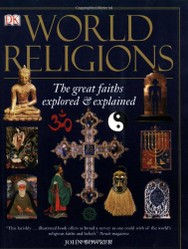The story of Sodom and Gomorrah is perhaps one of the best known Bible stories there is. Even people that gave up going to Church long time ago know this one. But do they really know it? Or do they just know what Hollywood told them? Did God destroy Sodom and Gomorrah? And if yes, why? Let's have a closer look at both the Bible and archeological evidence to get a better picture. As always I try to give space to different points of view and scholarship, but really, the story of Sodom and Gomorrah is pretty clear cut compared, for example, to Leviticus 18:22

Sodom and Gomorrah- What does the Bible say about homosexuality?
by Sam
Did God really destroy the towns of Sodom and Gomorrah because their citizens indulged in homosexual behavior or is there something else to this story? Read on to find out!
Sodom and Gommorah - A Very Short Recap
The story of Sodom and Gomorrah can be found in book of Genesis chapters 18 to 19. Here a short recap for those of you that don't remember it completely ;-)
A man called Abraham is visited by God who informs him that he about to destroy the cities of Sodom and Gomorrah because of their 'wickedness and sin'. Abraham pleads with God for the sake and life of the people that live there. Finally God agrees to spare the cities if there are at least ten righteous people living in them. God departs, and his two companions, which are actually two angels, continue their journey to Sodom where they arrive at Lot's, Abraham's nephew, house. He offers them hospitality and treats them as honored guests as it is the custom and the law of his faith. Whilst the angels are in Lot's house, all men from the city arrive before it and demand that the visitors are being brought out to them, so that they can 'know them' aka have sex with them. Lot refuses and offers the men instead two of his daughters, which have 'known no man' aka are virgins, to do with them as they like. A battle between the men and Lot is about to break out as the angels interfere and strike all attackers with blindness which effectively prevents the attack. The angels then inform Lot that God is about to destroy the city and that he needs to get his family out of there in order to save them. Unfortunately some members of his family don't believe Lot and decide to stay in Sodom. In the end it is only Lot and his two daughters and his wife that are escorted out of the city by the angels. The city is then destroyed by God 'with fire and brimstone raining from heaven'.
Strong stuff indeed, as a woman I especially have problems with Lot offering his own daughters up for being raped, but before we come to that, let's look at one important point:
Need an easy-to-read Bible translation to follow along? I recommend this one!
Click image for more details
 |
| Good News Bible: With Deuterocanonicals/Apocrypha [Good N... |
Looking for an illustrated Study Bible? Then this one is a good choice!
Click image for more details!
 |
| HarperCollins Study Bible - Student Edition: Fully Revise... |
What was the real sin of Sodom and Gomorrah?
Why did God destroy the cities of Sodom and Gomorrah, plus two others, Admah and Zeboyim, which were nearby? Christians who take the Bible absolutely literally will tell you that God did this because the inhabitants of these cities were all gay, or at least most of them. I am humming again my favorite tune 'It ain't necessarily so ...'
First of all, when God informs Abraham of his decision to destroy these cities, he only mentions 'wickedness' and 'great sin' plus he speaks of an outcry of the people living in the area complaining about them to God. Nowhere in the whole narrative is explicitly stated what the exact sin of Sodom was.
The only sin we can deduce from the text itself, is the sin against hospitality to strangers when the men of Sodom demand his guests from Lot so that they may 'know them' aka have sex with them. To understand the gravity of that, you need to have traveled or lived in the Middle East, or in any other part of the world where hospitality towards others is a law-like custom. This was even stronger in the past, when hospitality in those parts of the world was seen as a sacred duty and the host would have done everything, yes, including sacrificing his own daughters!, in order to fulfill his obligation towards his guests. Therefore
The sin of Sodom was NOT homosexuality, it was the breach of hospitality attempted by the inhabitants of Sodom towards Lot's guests!
Gang-Rape, like any other form of rape, has actually little to do with sexuality, as any psychologist can confirm you, but has all to do with violence, power over others and ultimately humiliating the rape victim. And, in the case of male to male rape, about establishing power over another man and emasculating him.
The Last Days of Sodom and Gomorrah
Woefully inacurate concerning history and Bible text, but still a great movie for a rainy day ;-)
 |
| Last Days of Sodom & Gomorrah |
Movie Trailer
Click image on the left for more details!
The Jewish (Rabbinic) View on the Events in Sodom and Gomorrah
The story of Sodom and Gomorrah is told in Genesis, the first book of the Pentateuch or Torah, the Jewish Bible, also known to us as part of the Old Testament. Therefore it is only logically to look at how Jewish scholars interpret the described events.
- The Jewish Encyclopedia provides background information about the law regarding hospitality, its sacredness and the duties of host and guest: http://www.jewishencyclopedia.com/articles/7905-hospitality Its articles give a fascinating insight into the understanding of hospitality in the Jewish context from the past to the present. Highly recommended!
- Many rabbinic writers (teachers of the Jewish faith) describe the sin of Sodom with the following words: blasphemy, bloodshed, cruel to strangers and the poor, selfish, without compassion, adultery and many more.
- No Jewish source, that I know of, describes or mentions homosexual acts (other than premeditated gang rape of guests, which is primarily about power and not an indication of the sexual orientation of the people of the city) as the prime sin of Sodom.
There are several extra-biblical / rabbinic stories in existence regarding the behavior of the citizens of Sodom, here some of the more cruel ones:
- They would give money or gold to a poor person with the signature / mark of the giver on them and subsequently would refuse to sell food to the poor that wanted to pay with this money or gold. After the poor had died of starvation they would ask for their money / gold back. - An example of a cruel, senseless act designed with the only goal to make other people suffer.
- Another story tells us that they had special beds for guests and strangers. If the guest was too tall for the bed they would cut him or her to the right size, if the guest was too short, they would stretch him or her until s/he fitted into it. - An allegory to the perceived situation that the guest had to adjust him / herself to the host and not the other way round as it was custom.
- Another, equally apocryphal, story tells us that a servant of Abraham was hurt by a stone thrown by a citizen whilst visiting Sodom and subsequently charged for the service of bloodletting (a common, albeit little effective, medical treatment of the time). - A story about the greediness of the people of Sodom that would charge guests, against custom, for pretty much everything, even for injuries suffered by their hands.
- In the Talmud (Jewish wisdom literature) we can read the story of Paltith, daughter of Lot, that gave bread to a poor stranger and was cruelly punished and put to death for her deed of compassion.
The Jewish writer, scholar and HuffingtonPost blogger Jay Michaelson summed the story of Sodom up in a far better way than I could ever hope to do it:
"Reading the story of Sodom as being about homosexuality is like reading the story of an ax murderer as being about an ax."
Other Biblical Evidence
The most interesting reference to the events described in Genesis comes from the book of the prophet Ezekiel, chapter 16:49-50:
"Now this was the sin of your sister Sodom: She and her daughters were arrogant, overfed and unconcerned; they did not help the poor and needy. They were haughty and did detestable (toevah) things before me. Therefore I did away with them as you have seen."
For the meaning of 'toevah', often also translated as 'abomination', please refer to >>>this paragraph<<< in one of my previous articles.
No reference to any form of sexual misbehavior here, but a lot of reference to not caring for the poor and needy. A clear reference to the duty of hospitality. Ezekiel lived around the 6th century before Christ, meaning that between the written form of the two books lay less then 100 years.
Other Statements in the Old Testament regarding Sodom:
The prophet Jeremiah (23:14) compares the sins of the Jerusalem of his time to Sodom by using the words 'adultery, lying and supporting evildoers'.
The prophet Amos speaks about the oppression of the poor and weighting down the needy in Sodom.
Why do we speak then about Sodomy and Sodomy Laws?
Because of Sodom, no doubt here ;-) But just because a misinterpretation of a biblical text made it into everyday language doesn't mean that said interpretation is right! The terms 'sodomy' and the subsequently named 'sodomy laws' were used for the first time in the 6th century of our time, meaning a long time after the text in Genesis was actually written! Long as in one thousand years later...
If you want to know more about this word usage, I strongly recommend reading these Wikipedia articles:
Where were Sodom and Gomorrah?
Frankly, we don't know exactly and actually there is little archeological evidence that points to an exact location for the cities of Sodom and Gomorrah. Biblical sources state that they were somewhere in the region around the Dead Sea. Strabo, the Greek geographer who lived around 64/63 BCE – ca. 24 CE and traveled the area widely believed it to have been in he same region. And many modern-day archeologists also believe them to have been somewhere in that area.
Somewhere in this area might have been Sodom and Gomorrah
Did Sodom and Gomorrah really exist?
Until somebody finds archeological evidence, we simply can't be sure ;-) But no matter how you look at it, the story of Sodom and Gomorrah is a powerful one, no matter if you read it as:
- Something that really has happened in the past.
- A composite story of several events that have actually taken place in the past.
- Or an allegory about the human nature and its short comings.
But no matter if you think that these events have taken place in the past as described in the Bible, the story of Sodom and Gomorrah was never about homosexuality, but about greed and lack of hospitality and God's disapproval of that attitude!
Interested in scientific findings regarding Bible events? Than this book might be interesting for YOU! Written by a real-life Indiana Jones ;-)
Click image for all details!
 |
| Return to Sodom and Gomorrah |
You might also like
Gay Churches - How to find an inclusive ChurchGoing on vacations, moving or just want to explore a new Church? Finding a Ch...
Ordained Online – Scam, Mockery or Outright Dangerous?Getting ordained online seems to be the latest craze on the internet. Some pe...



 How to Choose the Topic for your First Bookon 12/17/2012
How to Choose the Topic for your First Bookon 12/17/2012
 Why I published my first book on Amazon - and you should too ;-)on 11/30/2012
Why I published my first book on Amazon - and you should too ;-)on 11/30/2012
 What to do with Kids in Prague - Go To the ZOOon 10/30/2012
What to do with Kids in Prague - Go To the ZOOon 10/30/2012
 Choco Story Museum - Things to do with Kids in Pragueon 10/30/2012
Choco Story Museum - Things to do with Kids in Pragueon 10/30/2012



Comments
Thanks for your kind words!
Aw I knew I left a comment on this topic. I really enjoyed your other article. It's obvious you took a great deal of time and careful consideration writing this series. Again, thanks for covering such a delicate topic.
Thanks Katie! Means a lot coming from you!
What a brave topic. Thank you for covering this heavily debated issue. Couldn't have been done by a better author. :)K
So true! Quite a lot of the very fundie, oh so anti-gay preachers of the past have now come out of the closet and admitted being gay themselves, see for examplehttp://thinkprogress.org/lgbt/... or Mel White who was a ghost writer for the Christian right before coming out http://en.wikipedia.org/wiki/Mel_White
Well, we have an Israeli saying: "The hat on the head of the thief is aflame". Do you get my meaning? In more psychological terms, this preoccupation may have been, in fact, a projection onto others of what was a personal issue for those who started the whole big-deal about it.
Thanks Sheri, first I have to round this mini series up ;-) Fortunately there are actually very few bits in the Bible that make reference to homosexuality at all - so it is a manageable task. But it also shows how out of proportion the topic is blown by many Churches, there are 66 books in the Bible and perhaps a dozen verses / mentioning of homosexual behavior. It really shouldn't be such a huge topic!
You are so right - I only went on about the fate of Lot's wife since you did mention the question regarding whether or not these events actually happened in history. It is worth another article - Go for it! You're on a roll.
Yes, that is a main difference between the Jewish interpretation of the story and the one many fundamentalist Christians have as I have pointed out further down in the article. But this misinterpretation has even found its way in many European languages (sodomy ect). Thanks for commenting and confirming the Jewish point of view - in the end this story is part of the OLD Testament - the Jewish Bible so to speak.
As for Lot's wife and her fate, I cut the story deliberately off before that point because it has nothing to do with the question about the actual sin(s) of Sodom and Gomorrah. That would be material for another article ;-)
I was surprised to see in your title the linkage between homosexuality and the Sodom and Gomorrah story. The way we always learned the story was that their sins were many - and I agree with your explanation that the crime related to Lot's guests was the intended rape that had nothing to do with homosexuality or sexuality at all, but with power and domination,
It is true that hospitality to guests is a fundamental aspect of Middle Eastern culture. There are cultural aspects to visiting and hosting that took me awhile to learn after I moved here.
Back to Lot: In fact, a pillar of salt stands near the southern reaches of the Dead Sea, and it is a tourist attraction, named "Lot's Wife".
There is some evidence that at the time of the story, the entire plains where the Dead Sea now is was a very fertile agricultural area and then an earthquake destroyed it all - the timing fits.